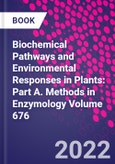Biochemical Pathways and Environmental Responses in Plants, Part A, Volume 676 in the Methods in Enzymology series highlights new advances in the field with this new volume presenting interesting chapters on topics such as Structure, function, and engineering of plant polyketide synthases, A sensitive LC-MS/MS assay for enzymatic characterization of methylthioalkylmalate synthase involved in glucosinolate side-chain elongation, Assaying formate-tetrahydrofolate ligase with monoglutamylated and polyglutamylated substrates using a fluorescence-HPLC based assay, An Approach to Nearest Neighbor Analysis of Pigmented Protein Complexes by Using Chemical Crosslinking in Combination with Mass Spectrometry, and much more.
Other chapters cover Biochemical characterization of plant aromatic aminotransferases, Functional Analysis of Phosphoethanolamine N-methyltransferase (PMT) in Plants and Parasites, A structure-guided computational screening approach for predicting plant enzyme-metabolite interactions, Plant metacaspase: an example of microcrystal structure determination and analysis, Biocatalytic system for comparative assessment of functional association of cytochrome P450 monooxygenases with their redox partners, Dirigent Protein Family Function and Structure, and more.
Please Note: This is an On Demand product, delivery may take up to 11 working days after payment has been received.
Table of Contents
1. Structure, function, and engineering of plant polyketide synthasesIkuro Abe
2. A sensitive LC-MS/MS assay for enzymatic characterization of methylthioalkylmalate?synthase involved in glucosinolate side-chain elongation
N Bisht
3. Assaying formate-tetrahydrofolate ligase with monoglutamylated and polyglutamylated substrates using a fluorescence-HPLC based assay
Sanja Roje
4. An Approach to Nearest Neighbor Analysis of Pigmented Protein Complexes by Using Chemical Crosslinking in Combination with Mass Spectrometry
Haijun Liu
5. Biochemical characterization of plant aromatic aminotransferases
Hiroshi Maeda
6. Functional Analysis of Phosphoethanolamine N-methyltransferase (PMT) in Plants and Parasites
Soon Goo Lee
7. A structure-guided computational screening approach for predicting plant enzyme-metabolite interactions
Cynthia Holland
8. Plant metacaspase: an example of microcrystal structure determination and analysis
Qun Liu
9. Biocatalytic system for comparative assessment of functional association of cytochrome P450 monooxygenases with their redox partners
Chang-Jun Liu
10. Dirigent Protein Family Function and Structure
Norman G. Lewis
11. Lignin/Lignan Biosynthesis Structure/Function
Norman G. Lewis
12. Discovery and characterization of BAHD acylsugar acyltransferases
Robert L. Last
13. Near-real time determination of BAHD acyl-coenzyme A transferase reaction rates and kinetic parameters using Ellman's reagent
Michael Sullivan
14. Quantification of N-terminal protein acetyltransferase activity in vitro and in planta
Markus Wirtz
15. Computational and biochemical methods to measure the activity of carboxysomes and protein organelles in vivo
Jeffrey Cameron
16. Analysis of Plant Alkaloid-Protein Interactions Using Differential Scanning Fluorimetry and Isothermal Titration Calorimetry
Peter Facchini
17. A metabolomics strategy for plant specialized metabolites using liquid chromatography-mass spectrometry
Kazuki Saito and Tetsuya Mori
18. Isoprene measurements to assess the methylerythritol pathway
Thomas D. Sharkey
19. Analysis of isoprenoid alcohol phosphates by liquid chromatorgraphy-mass spectrometry
Peter D�rmann and Katharina Gutbrod
20. Using targeted metabolomics to elucidate the indole auxin network in plants
Jerry D. Cohen and Adrian D. Hegeman
21. Metabolite fingerprinting: A powerful metabolomics approach for marker identification and functional gene annotation
Ivo Feussner
22. Ex vivo metabolomics, an hypothesis-free approach to identify native substrate(s) of orphan enzymes
Kirstin Feussner
23. Using stable isotopes and LC-MS for precursor of origin determination in plants
Clint Chapple
24. Measurement of flux through sulfate assimilation using [35S]sulfate
Stanislav Kopriva
25. Assessment of the activity of sulfate uptake and assimilation in plants
R�diger Hell
26. Comparison of TLC, HPLC, and direct infusion mass spectrometry methods for the identification and quantification of diacylglycerol molecular species
Philip Bates
27. Plant sphingolipid analysis
Jennifer E. Markham
28. Strategies to study the metabolic origins of plant specialized metabolites: the 1,4-naphthoquinones in Lithospermum erythrorhizon
Joshua R. Widhalm
29. Controlled environments for highly reproducible cannabis 'omics' studies
Bernd Markus Lange
30. Multi-platform approaches for the comprehensive analysis of aroma volatiles in cannabis
Bernd Markus Lange
31. Systems and strategies for plant protein expression
Thomas D. Niehaus
32. Programmable Chemical Actuator Control of Soluble and Membrane-Bound Enzymatic Catalysis
Katrina Cornish
33. CRISPR-Cas mediated genome engineering of cyanobacteria
Himadri B. Pakrasi
34. Plant Seed Proteome Analysis
Hari B. Krishnan
35. Proteomics and phosphoproteomics of C3 to CAM transition in the common ice plant
Sixue Chen
36. Identification of MPK4 interactome using TurboID proteomics
Sixue Chen
37. A Three-in-One Method for High Throughput Plant Multiomics
Sixue Chen
38. Assessing simultaneous reversible cysteine oxidation and global abundance in plant tissues
Leslie M. Hicks
39. Analysis of plant flooding response
Simon Gilroy
40. Imaging systemic calcium response and its molecular dissection using virus-induced gene silencing
Simon Gilroy
41. Studying the dynamics of transcriptional complex formation as a function of temperature using small angle x-ray scattering and in vitro assays
Chloe Zubieta
42. Isolation of novel chemical components and their target plant proteins in metal stress conditions
Ryoung Shin
43. Inhibition of insect Na+/K+?ATPases by plant-derived cardiac glycosides
Georg Petschenka Jander
44. High-throughput phenotyping and the use of computer vision to unravel novel phenotypes associated with plant nutrition
David Mendoza-Cozatl
45. Detection of protein persulfidation in plants by the dimedone switch method
Luis C. Romero and Cecilia Gotor
46. Using Hyper as a Molecular Probe to Visualize Hydrogen Peroxide in Living Plant Cells: An Updated Method
Luis C�rdenas
47. Genetically encoded sensors for monitoring the spatiotemporal dynamics of glucose and sucrose
Wolf B. Frommer and Nora Zoellner
48. Acetylene Reduction Assay for Nitrogenase Activity
Senthil Subramanian
49. Monitoring lipid-protein interactions?in planta?using?F�rster resonance energy transfer
Xuemin (Sam) Wang
50. Modification of G-protein biochemistry and its effect on plant/environment interaction.
Sona Pandey
51. RNA-seq analysis of alternative pre-mRNA splicing mediated by photoreceptors in?Physcomitrium patens
Shih-Long Tu








